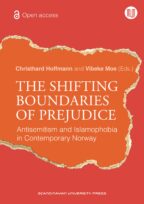Data:
//
Fonte:
Idunn
Autore:
Christhard Hoffmann & Vibeke Moe
Anno:
2020
The Shifting Boundaries of Prejudice: Antisemitism and Islamophobia in Contemporary Norway
Edited by Christhard Hoffmann & Vibeke Moe
Published by Universitetsforlaget, pp. 318
Per visualizzare il libro completo clicca sul link.
Introduction:
In present-day Europe, antisemitism has again become an issue of public concern.According to a recent survey, 28 per cent of European Jews experienced anti-Jewish harassment over the last year and close to 40 per cent have considered emi-gration during the last five years because of rising anti-Jewish hostilities (1). The new threat for Jews in Europe is often attributed to antisemitic attitudes amongMuslim immigrants. At the same time, Islamophobic ideas have gained ground in Europe as a political tool and have become an integral part of an ideological worldview, particularly on the far right of the political spectrum. Intensified by deeply divided opinions on the Israeli-Palestinian conflict, this constellation has framed a view of antisemitism and Islamophobia as essentially different (2).
The present volume challenges this view. Based on varied and comprehensive survey data about attitudes towards Jews and Muslims in Norway, it provides amore differentiated picture. While the empirical evidence shows that Muslims in Norway support stereotypical ideas about Jews to a greater extent than the general population, and that opinions on the Israeli-Palestinian conflict are connected to attitudes towards Jews and Muslims in opposite directions, it also indicates that antisemitism and Islamophobia are closely related phenomena, and are linked to xenophobic ideas in the general population. The minorities’ experiences of discrimination show that Jews and Muslims share a number of the same problems associated with being minorities in Norway, and therefore see a possibility to cooperate on combating prejudice and discrimination.
1. European Union Agency for Fundamental Rights (FRA), Experiences and perceptions of anti-semitism. Second survey on discrimination and hate crime against Jews in the EU (Luxem-bourg: Publications Office of the European Union, 2018), 12.
2. As James Renton and Ben Gidley have observed, this view is often influenced by the present political situation, “in which the figures of the persecuted Jew and the political Muslim are on opposite sides of a war waged by the West.” James Renton and Ben Gidley, eds., Antisemitism and Islamophobia in Europe. A Shared Story? (London: Palgrave Macmillan, 2017), 4. On the problems of comparing Islamophobia and antisemitism, see Brian Klug, “The limits of analogy:Comparing Islamophobia and antisemitism”, Patterns of Prejudice 48:5 (2014): 442–459; Gideon Botsch, Olaf Glöckner, Christoph Kopke, Michael Spieker, eds., Islamophobie und Anti-semitismus – ein umstrittener Vergleich (Berlin and Boston: De Gruyter, 2012).


